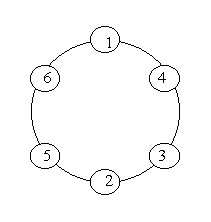Problem Description
A ring is compose of n circles as shown in diagram. Put natural number 1, 2, ..., n into each circle separately, and the sum of numbers in two adjacent circles should be a prime.
Note: the number of first circle should always be 1.

Note: the number of first circle should always be 1.

Input
n (0 < n < 20).
Output
The output format is shown as sample below. Each row represents a series of circle numbers in the ring beginning from 1 clockwisely and anticlockwisely. The order of numbers must satisfy the above requirements. Print solutions in
lexicographical order.
You are to write a program that completes above process.
Print a blank line after each case.
You are to write a program that completes above process.
Print a blank line after each case.
Sample Input
6 8
Sample Output
Case 1: 1 4 3 2 5 6 1 6 5 2 3 4 Case 2: 1 2 3 8 5 6 7 4 1 2 5 8 3 4 7 6 1 4 7 6 5 8 3 2 1 6 7 4 3 8 5 2
#include <iostream>
#include <cstdio>
#include<algorithm>
#include<cmath>
using namespace std;
int a[25];
bool vis[25];
int n;
bool prime(int k){
int i;
for(i =2 ; i * i < k+1 ; i++){
if(!(k%i))
return false;
}
return true;
}
void dfs(int cur)//深度搜索;
{
if(cur == n && prime(a[n-1]+a[0])){
for(int i = 0 ; i < n; i++)
printf("%d ",a[i]);
printf("\n");
}
for(int j = 2 ;j <= n ; j++){
if(!vis[j]){
if(prime(a[cur-1]+j)){
vis[j] = true;
a[cur] =j;
dfs(cur+1);
vis[j] = false;
}
}
}
}
int sum = 1;
int main(){
while(scanf("%d",&n)!=EOF){
a[0] = 1;
printf("Case %d:\n",sum++);
dfs(1);
printf("\n");
}
return 0;
}





 本文介绍了一个关于环形排列的问题,要求将1到n的自然数填入由n个圆圈组成的环中,使得相邻两个圆圈内的数字之和为素数。文中提供了一段C++代码实现该问题的解决方案,采用深度优先搜索算法完成这一过程。
本文介绍了一个关于环形排列的问题,要求将1到n的自然数填入由n个圆圈组成的环中,使得相邻两个圆圈内的数字之和为素数。文中提供了一段C++代码实现该问题的解决方案,采用深度优先搜索算法完成这一过程。
















 854
854

 被折叠的 条评论
为什么被折叠?
被折叠的 条评论
为什么被折叠?








